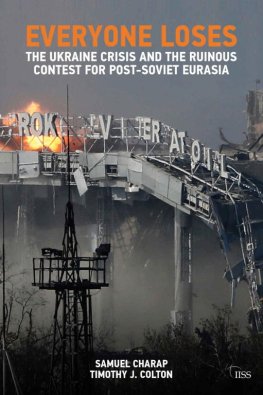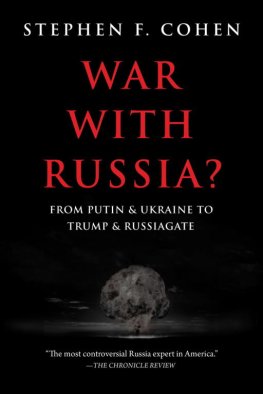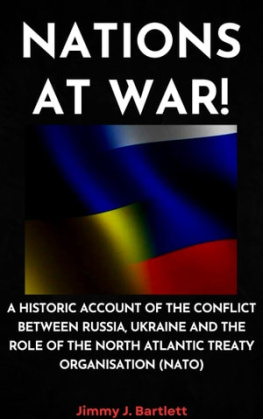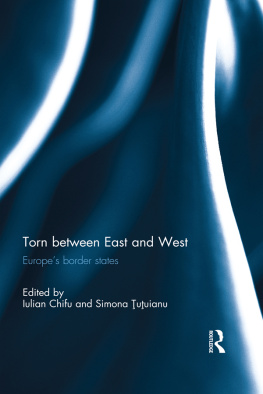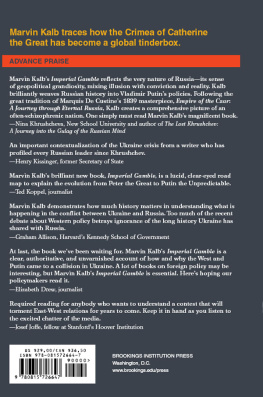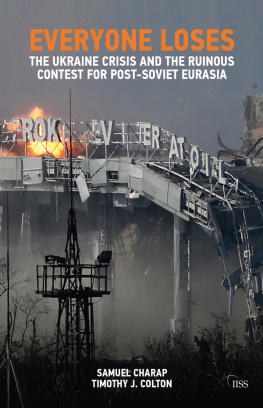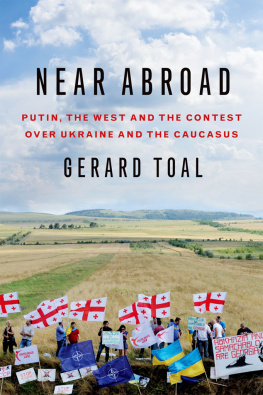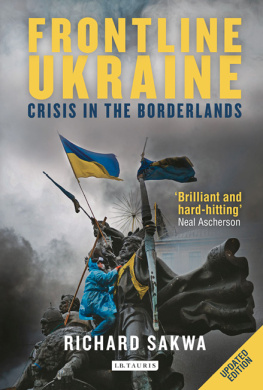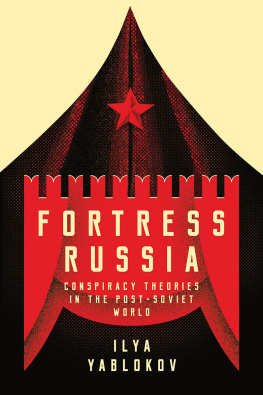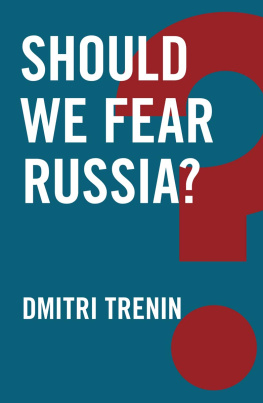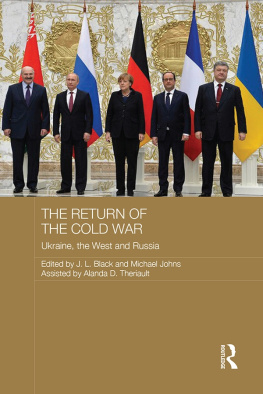Samuel Charap
Timothy J. Colton
EVERYONE LOSES:
THE UKRAINE CRISIS AND THE RUINOUS CONTEST FOR POST-SOVIET EURASIA
The International Institute for Strategic Studies has been a nurturing and collegial professional environment for one of us (Charap) during the course of the research and writing. His co-author (Colton) has benefited greatly from the support of the Davis Center for Russian and Eurasian Studies and the Weatherhead Center for International Affairs, both at Harvard University, and from the Institut fr die Wissenschaften vom Menschen, Vienna.
A number of colleagues in several countries were kind enough to read the draft and to supply thoughtful feedback: Steedman Hinckley, Sergei Karaganov, Ivan Krastev, Andrej Krickovic, Fyodor Lukyanov, Roderic Lyne, Neil MacFarlane, Michael McFaul, Alex Pravda, Mary Sarotte, Mikhail Troitskiy and Alexandra Vacroux, who was also a terrific organisational bulwark. The final product was greatly improved as a result, although, needless to say, responsibility for it is ours alone.
John Drennan of the IISS provided yeoman research assistance for the project from its early stages through the final throes. Without his sharp eye and unflappable determination, this book would not have been possible. IISS interns Valeria Bondareva and Tetyana Sydorenko also assisted with the research, under Johns supervision. Neil Buckley of the Financial Times generously shared unpublished reporting materials from his files. We are grateful to Nicholas Redman at the IISS for commissioning this as an Adelphi book, for his patience throughout, and for giving the draft manuscript a careful review. We warmly thank Alice Aveson for her thorough copy edit, John Buck and Kelly Verity for the design of the cover and the graphics, and Gaynor Roberts for managing the editorial process. The Working Group on the Future of USRussia Relations (supported by Carnegie Corporation of New York), while not directly involved with the book, supplied a discussion forum for many of the phenomena and ideas treated in Everyone Loses.
Finally, we are grateful to our spouses for tolerating a demanding writing schedule, particularly in the final months.
A/CFE Agreement on Adaptation of the Treaty on Conventional Armed Forces in Europe
AA Association Agreement
CFE Treaty on Conventional Armed Forces in Europe
CIS Commonwealth of Independent States
COMECON Council for Mutual Economic Assistance
CSCE Conference on Security and Co-operation in Europe
CSTO Collective Security Treaty Organization
DCFTA Deep and Comprehensive Free Trade Area agreement
DNR Donetsk Peoples Republic
EC European Community
EEC Eurasian Economic Commission
EEU Eurasian Economic Union
ENP European Neighbourhood Policy
EU European Union
GDR German Democratic Republic
GTEP Georgia Train and Equip Program
GUAM Georgia, Ukraine, Azerbaijan and Moldova
GUUAM Georgia, Ukraine, Uzbekistan, Azerbaijan and Moldova
IMF International Monetary Fund
LNR Luhansk Peoples Republic
MAP Membership Action Plan
NATO North Atlantic Treaty Organization
NGO Non-governmental organisation
OHCHR Office of the United Nations High Commissioner for Human Rights
OSCE Organization for Security and Co-operation in Europe
PCA Partnership and Cooperation Agreement
PfP Partnership for Peace
PKF Peacekeeping force
RSFSR Russian Soviet Federative Socialist Republic
SES Single Economic Space
USSR Union of Soviet Socialist Republics, or Soviet Union
WTO World Trade Organization
15 March 1988 Mikhail Gorbachev repudiates Brezhnev Doctrine justifying Soviet dominance over East Central Europe
9 November 1989 Fall of Berlin Wall
3 October 1990 Unification of East and West Germany
19 November 1990 CFE and Charter of Paris for a New Europe signed at CSCE
28 June 1991 COMECON disbanded
1 July 1991 Warsaw Pact disbanded
21 August 1991 Estonia, Latvia and Lithuania declare independence from USSR
8 December 1991 Belavezha Accords signed, declaring end of USSR and establishment of CIS
25 December 1991 Gorbachev resigns as president of Soviet Union
26 December 1991 Official dissolution of Soviet Union
15 May 1992 Collective Security Treaty (Tashkent Treaty) signed by Russia, Armenia, Kazakhstan, Kyrgyzstan, Tajikistan and Uzbekistan
24 June 1992 Moscow brokers end to war between Georgians and South Ossetians
21 July 1992 Ceasefire to end conflict in Moldovas Transnistria province
2122 June 1993 Three Copenhagen Criteria for enlargement of the EU adopted at European Council in Copenhagen
10 January 1994 NATO PfP programme launched
14 May 1994 Moscow brokers end to war between Georgians and Abkhaz
5 December 1994 Budapest Memorandum on Security Assurances for Ukraine signed by Russia, US and UK
1 January 1995 CSCE renamed OSCE
27 May 1997 NATORussia Founding Act on Mutual Relations, Cooperation and Security signed
31 May 1997 Friendship treaty signed by Russian president Boris Yeltsin and Ukrainian president Leonid Kuchma
10 October 1997 Georgia, Ukraine, Azerbaijan and Moldova form GUAM consultative forum
12 March 1999 Czech Republic, Hungary and Poland join NATO
19 November 1999 A/CFE signed at Istanbul summit of OSCE
31 December 1999 Yeltsin resigns, Vladimir Putin becomes acting president of Russia
26 March 2000 Putin elected president
7 October 2002 Establishment of CSTO
23 November 2003 Eduard Shevardnadze resigns as Georgian president, in the culminating moment of Rose Revolution
24 November 2003 President Vladimir Voronin of Moldova scuttles Kozak Memorandum plan for resolving the Transnistria dispute.
29 March 2004 Bulgaria, Estonia, Latvia, Lithuania, Romania, Slovakia and Slovenia join NATO
1 May 2004 Czech Republic, Estonia, Hungary, Latvia, Lithuania, Poland, Slovakia and Slovenia join EU
12 May 2004 European Neighbourhood Policy announced
28 December 2004 Viktor Yushchenko elected president of Ukraine in run-off prompted by Orange Revolution protests
3 April 2005 Tulip Revolution in Kyrgyzstan forces resignation of president Askar Akaev
10 May 2005 Russia and EU sign framework documents for four Common Spaces
31 December 2005 First RussiaUkraine gas war begins
12 December 2007 Putin suspends implementation of CFE agreement
2 March 2008 Dmitry Medvedev elected president of Russia
24 April 2008

